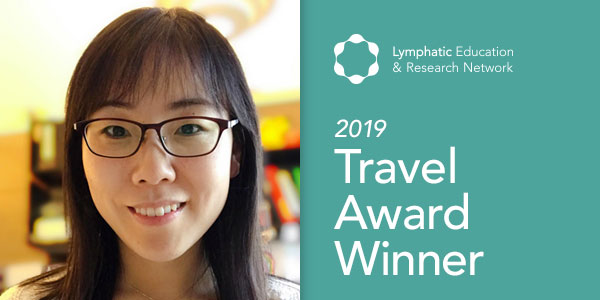Wenjing Xu, Ph.D., currently a postdoc at the University of North Carolina at Chapel Hill, under the supervision of Kathleen Caron, Ph.D., received a Travel Award from LE&RN to attend the 2018 Lymphatic Forum in Austin. She also won the Poster Award. We asked Wenjing to share her thoughts on that experience with us and to tell us a bit about her research and future plans.
What did you get out of the Forum? Why did you feel it was important to attend?
This is my second time attending the Lymphatic Forum. After familiarization with people in the lymphatic field two years ago, this year I met more leaders and more researchers in this field and heard from people with different or similar research interests, which encouraged me to accelerate my own research. Additionally, networking is always important, and attending the Forum gave me a wonderful opportunity. I exchanged opinions on interesting topics with some researchers, and I also worked with a postdoc fellow as a team to chair the Young Investigator Session. During the preparation of our session, we had a great chance to interact with our session advisors and learned the experience they had as a chair of a meeting session. I felt very lucky and touched to meet the patients at the Forum and listened to the experience they were still suffering, which is very motivating to me as a young scientist and makes me feel more important and valuable about our research. In summary, as a third-year postdoc, this experience is valuable to me and my future career. Thanks to the LE&RN Travel Award for supporting my trip to this fantastic meeting.
What are your areas of interest in research?
I am very interested in cardiovascular biology and how my research could help people with cardiovascular diseases. My research focuses on how lymphatic paracellular junctions are regulated by adrenomedullin, a multifunctional hormone which is crucial in lymphatic development.
What are your hopes and plans for your career and your research?
Basic medical research is fundamental to the clinical treatment of patients. As I become more and more independent as a postdoc, I would love to find my own research interest and contribute to the lymphatic field. Eventually, I hope my research will help clinicians treat patients with lymphatic diseases.
Why do you believe that, in general, lymphatic research is important? What might the field accomplish within the next few years?
Although lymphatics have been neglected before, more and more exciting research has drawn people’s attention to the fact that lymphatics have their own unique biology and function and play an indispensable role in every tissue. Disruption of lymphatic development or lymphangiogenesis leads to serious consequences which is not only shown in basic research but also lets hundreds of millions of people suffer from it without any effective treatment. Lymphatic research is the tool revealing unknown aspects of our lymphatic systems in different tissues and diseases, the way helping alleviate the pain of patients, and the path leading to the cure for lymphatics diseases. Lymphatic research will keep surprising us with novel and exciting news. I could see within the next few years, researchers will better understand lymphatic development and functions and develop new advanced methods to diagnose and treat lymphatic diseases. LE&RN’s effort in advocating for lymphatic research will keep bringing in more and more attention to this previously neglected but very important field, which will not only benefit lymphatic research itself but also help other research fields associated tightly with lymphatic research such as cancers, inflammation, allergies, neurological diseases, etc.
LE&RN programs, like LE&RN Travel Awards, are only possible because of our Partners and Supporting Members. Become a Supporting Member today.

